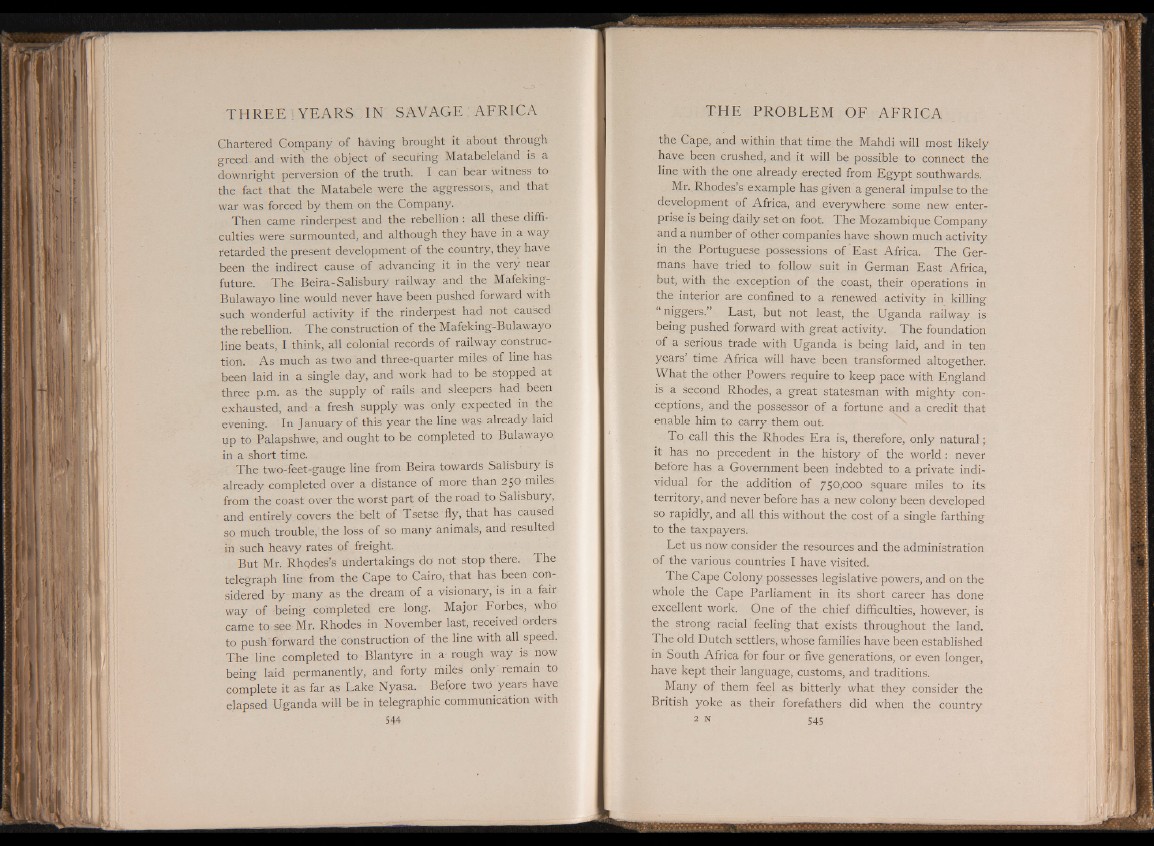
Chartered Company of having brought it about through
greed and with the object of securing Matabeleland is a
downright perversion of the truth. I can bear witness to
the fact that the Matabele were the aggressors, and that
war was forced by them on the Company.
Then came rinderpest and the rebellion : all these difficulties
were surmounted, and although they have in a way
retarded the present development of the country, they have
been the indirect cause of advancing it in the very near
future. The Beira-Salisbury railway and the Mafeking-
Bulawayo line would never have been pushed forward with
such wonderful activity if the rinderpest had not caused
the rebellion. The construction of the Mafeking-Bulawayo
line beats, I think, all colonial records of railway construction.
As much as two and three-quarter miles of line has
been laid in a single day, and work had to be stopped at
three p.m. as the supply of rails and sleepers had been
exhausted, and a fresh supply was only expected in the
evening. In January of this year the line was already laid
up to Palapshwe, and ought to be completed to Bulawayo
in a short time.
The two-feet-gauge line from Beira towards Salisbury is
already completed over a distance of more than 250 miles
from the coast over the worst part of the road to Salisbury,
and entirely covers the belt of Tsetse fly, that has caused
so much trouble, the loss of so many animals, and resulted
in such heavy rates of freight.
But Mr. Rhqdes’s undertakings do not stop there. The
telegraph line from the Cape to Cairo, that has been com.
sidered by many as the dream of a visionary, is in a fair
way of -being completed ere long. Major Forbes, who
came to see Mr. Rhodes in November last, received orders
to push'forward the construction of the line with all speed.
The line completed to Blanty-re in a rough way is now
being laid permanently, and forty miles only remain to
complete it as far as Lake Nyasa. Before two years have
elapsed Uganda will be in telegraphic communication with
544
the Cape, and within that time the Mahdi will most likely
have been crushed, and it will be possible to connect the
line with the one already erected from Egypt southwards.
Mr. Rhodes’s example has given a general impulse to the
development of Africa, and everywhere some new enterprise
is being daily set on foot. The Mozambique Company
and a number of other companies have shown much activity
in the Portuguese possessions of East Africa. The Germans
have tried to follow suit in German East Africa,
but, with the exception of the coast, their operations in
the interior are confined to a renewed activity in killing
niggers.” Last, but not least, the Uganda railway is
being pushed forward with great activity. The foundation
of a serious trade with Uganda is being laid, and in ten
years’ time Africa will have been transformed altogether.
What the other Powers require to keep pace with England
is a second Rhodes, a great statesman with mighty conceptions,
and the possessor of a fortune qnd a credit that
enable him to carry them out.
To call this the Rhodes Era is, therefore, only natural;
it has no precedent in the history of the world: never
before has a Government been indebted to a private individual
for the addition of 750,000 square miles to its
territory, and never before has a new colony been developed
so rapidly, and all this without the cost of a single farthing
to the taxpayers.
Let us now consider the resources and the administration
of the various countries I have visited.
The Cape Colony possesses legislative powers, and on the
whole the Cape Parliament in its short career has done
excellent work. One of the chief difficulties, however, is
the strong racial feeling that exists throughout the land.
The old Dutch settlers, whose families have been established
in South Africa for four or five generations, or even longer,
have kept their language, customs, and traditions.
Many of them feel as bitterly what they consider the
British yoke as their forefathers did when the country
2 N 545